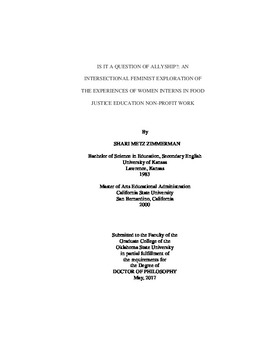| dc.contributor.advisor | Blum, Denise F. | |
| dc.contributor.author | Zimmerman, Shari Metz | |
| dc.date.accessioned | 2018-03-13T18:16:36Z | |
| dc.date.available | 2018-03-13T18:16:36Z | |
| dc.date.issued | 2017-05 | |
| dc.identifier.uri | https://hdl.handle.net/11244/54640 | |
| dc.description.abstract | Research indicates that food insecurity exists within a multi-dimensional intersectional system of oppression. Research also suggests that the work of nonprofit organizations intended to relieve suffering caused by food insecurity may exacerbate or perpetuate sexist, classist, and racist systems of oppression. This qualitative study was designed to explore the experiences of women working as interns or AmeriCorps members in food justice education; how an interest in food justice activism and advocacy emerged; and how that activist commitment was mediated through the social and relational interactions of the everyday work of food justice education. The research sample included 22 women working in food justice organizations in "Capital City," a Southern urban center in the U.S. Primary data collection methods included in-depth interviews, participant observation and a document survey, including a survey of online and social media sources. The data were coded through narrative analysis. Findings revealed that both formal and informal educational opportunities were instrumental in the emergence of an interest in food justice advocacy and allyship. Women extensively employed the use of social networks, mentors' advice, travel, technology and volunteer work to experiment with and sort through options when deciding upon a path to food justice work. Participants' food justice work provided opportunities to identify and understand gendered aspects of their work and that of constituents. Through their work, they formed a consciousness of privilege which was essential to social justice work and to understanding their own locations and that of other women within an intersectional matrix of domination. This knowledge aided in the growth of ally behavior, and contributed to successfully engaging children and youth in critical ecopedagogy for food justice education. | |
| dc.format | application/pdf | |
| dc.language | en_US | |
| dc.rights | Copyright is held by the author who has granted the Oklahoma State University Library the non-exclusive right to share this material in its institutional repository. Contact Digital Library Services at lib-dls@okstate.edu or 405-744-9161 for the permission policy on the use, reproduction or distribution of this material. | |
| dc.title | Is it a question of allyship?: An intersectional feminist exploration of the experiences of women interns in food justice education non-profit work | |
| dc.contributor.committeeMember | Bailey, Lucy E. | |
| dc.contributor.committeeMember | Worley, Virginia A. | |
| dc.contributor.committeeMember | Mix, Tamara L. | |
| osu.filename | Zimmerman_okstate_0664D_15221.pdf | |
| osu.accesstype | Open Access | |
| dc.type.genre | Dissertation | |
| dc.type.material | Text | |
| thesis.degree.discipline | Education | |
| thesis.degree.grantor | Oklahoma State University | |
